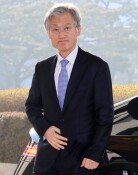New TEL carrying ICBM caught in Pyongyang
New TEL carrying ICBM caught in Pyongyang
Posted September. 24, 2020 07:43,
Updated September. 24, 2020 08:07
As equipment and troops are assembling at the Mirim Airport in Pyongyang to practice for the military parade to celebrate the 75th anniversary of the foundation of North Korea’s Workers’ Party on October 10, the U.S. authorities reported on Tuesday (local time) that the sight of two to four new transporter-erector-launchers (TELs) capable of launching intercontinental ballistic missiles (ICBMs) was caught in Pyongyang.
“The sight of new TELs indicates the likelihood of North Korea showing off its ICBM capabilities on the anniversary of the foundation of the Workers’ Party,” a member of the U.S. administration said to the Dong-A Ilbo. “We are keeping a close eye on a potential new variant of the Hwasong-15.” The Hwasong-15, which was launched on November 29, 2017 before a dialogue between the North and the U.S., is reported by the Ministry of National Defense to the National Assembly that its range exceeds 13,000 kilometers when launched at a normal angle, in other words, capable of reaching the east coast of the U.S.
The new ICBM TELs discovered recently are believed to have an improved chassis, which is comparable to the basic frame of the car body, and launch mechanism. It is likely to have been transported from Sain-ri, South Pyongan Province. North Korea was previously caught by the U.S. authorities assembling, finishing, and test-driving ICBMs and TELs in Sain-ri.
In addition, more than two KN15s, mid-range ballistic missiles, were found at the Mirim Airport. “We are focusing on the possibility that the new ICBMs might be an improved version of the KN15s assembled and finished in Sain-ri,” said the member of the U.S. administration.
“The high-ranking officials at the White House that I met recently are concerned about North Korea’s display of new mid- to long-range missile series using solid fuel at an unprecedentedly large parade this year,” said Harry Kazianis, a senior director of Korean studies at the U.S.-based think tank Center for the National Interest.
jkim@donga.com





![[천광암 칼럼]장동혁은 대체 왜 이럴까](https://dimg.donga.com/c/138/175/90/1/wps/NEWS/IMAGE/2026/02/22/133399127.1.jpg)

